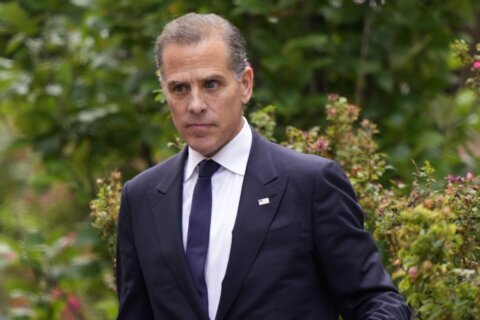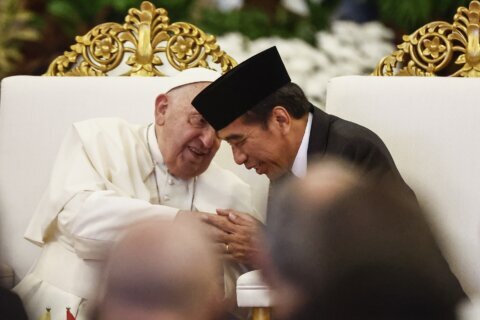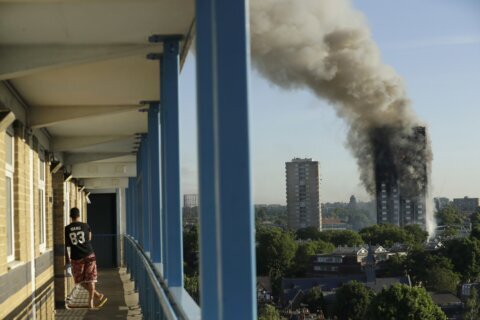Raising children through uncertain times like these is exhausting, made all the more difficult because most parents in the U.S. don’t have parallel experiences from their own childhoods to draw from. The war in Ukraine, arriving on the heels of all the instability and sadness of the pandemic, is another difficult moment for parents wondering how and how much to talk about the news with their children.
While we may want to avoid conversations about war with kids, we should assume that children are hearing about Russia’s invasion of Ukraine somewhere, whether in the hallways at school or from the news we consume at home. No matter how much we think we’re protecting them, Atlanta-based psychologist Ginny Kington says that information is likely getting through. “The kids are very aware of it and it’s important to talk to them about it,” she says.
Further, hearing only snippets of what’s going on “can be scarier than knowing the whole story” and exacerbate kids’ anxiety. That’s why, she says, honest conversations with kids about Ukraine are important.
[READ: Schools Confront Continued Mental Health Needs.]
What to Say to Kids About Ukraine
Dawn Lane, a school counselor at the Mabel I. Wilson elementary school in Cumberland, Maine, says staff have approached her with questions about what to say when kids bring up the topic. Teachers are “prepared to listen intently to those children and to respond accordingly, whether it be answering their questions, clarifying any misinformation and/or directing them to speak with the adults they trust at home,” she says.
At the middle and high school levels, social studies teachers give updates and try to help students understand the news. However, these conversations can vary by classroom. In other words, parents should not assume that schools are taking the lead on discussing current events, and should begin these conversations with their children. (You can always contact your child’s school to ask how they are handling this subject).
Lane recommends starting talks with kids about Ukraine by asking them what they already know. That can give you insight about where they are coming from, and allow you to correct any misinformation. After you’ve established their baseline knowledge, what you share next should be shaped by your child’s age, maturity and emotional sensitivity.
For elementary-aged children, Kington suggests being straightforward and factual. You could tell them, “Russia has invaded Ukraine; our country’s trying to help Ukrainians defend themselves,” she says. At that age, that might be enough. Middle and high schoolers may be more interested in some of the history and the role the U.S. is taking in terms of leading economic sanctions, and Kington says it’s appropriate at this age to provide more details if kids want them.
Lane points to this resource page from the Anti-Defamation League as a place to start. And she adds that for older children, “It’s OK to go deeper into their own feelings and even their beliefs about what’s happening.” Asking for their thoughts can help them develop critical thinking skills about tough issues. “You could even seek out reputable news sources together,” she says.
Addressing Kids’ Worries About War
Sometimes the hardest questions to answer stem from anxiety, says Kington. While we can look up information we don’t know, questions like, “What if the war keeps getting worse and the United States has to get involved?” don’t have a straightforward answer.
“Let them know that it’s normal to worry about something like that, and you can validate that it’s a scary time and those are scary thoughts,” she says. “You can also reassure them that there’s no signs right now that those things are going to happen, and you can encourage them to focus on only what they know is happening in the present moment.”
New Jersey mom Pooja Makhijani says she has already had several conversations with her 4th grade daughter about Ukraine, usually sparked by something her child hears on the news or from other adults. Makhijani says that while she starts by answering the questions her daughter has, the conversation can open the door to larger discussions about their family’s values, and how nations are connected. “It’s also a good way to talk about things a little bit more holistically,” she says, by sharing “the things that we want for the world.”
Once you’ve started the discussion, Kington says to keep the door open for further conversations by saying something like, “I’m here if you have any other questions for me. The situation keeps changing so we can keep talking about it as the days go on.” Follow up by checking in with your child in a few days.
[READ: Mindfulness Activities for Kids.]
Other Steps Parents Can Take
Experts recommend focusing on what you can control during this time. One thing that Lane advises is monitoring media intake for everyone in the home. Whether it’s the television on in the background or the radio in the car on the way to school, she says children may hear news that can be frightening to them, adding that children with access to Google or YouTube are likely “coming into contact with information that they’re not quite able to process.”
Lane also advises giving young people opportunities to help, which provides a sense of control. With young children, something as simple as “sitting down as a family and sending a kind wish,” can suffice, as can drawing a picture or writing a story for children in Ukraine. Older children may be inclined to make donations or write to their representatives about their feelings.
Chances to volunteer with your children to support the Ukrainian people may soon come up as well. In Lane’s district, fourth and fifth graders are participating in a read-a-thon, with proceeds going to support Ukraine. Makhijani said that when Afghanistan was in the news over the summer, she and her daughter worked on refugee resettlement near where they live. “That hit a little closer to home because it felt so real,” she says.
Lane notes this difficult time is an opportunity for parents and teachers to help kids find positive human moments. In the spirit of Mister Rogers’ famous advice to “look for the helpers,” adults can highlight instances of people doing extraordinary things for each other, which is common during a crisis. “Pointing out the good in the world, especially when it feels like there is so much going wrong, can help kids to remain positive and hopeful,” she says.
More from U.S. News
How to Handle Bullying at School
Create a Better Morning Routine for School
What to Do When Your Kid Refuses to Go to School
Talking to Kids About the War in Ukraine originally appeared on usnews.com







